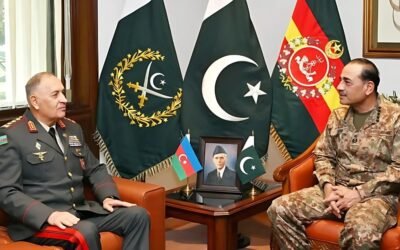MIANYANG/SHANGHAI – President Asif Ali Zardari spent Sunday advancing Pakistan’s time-tested, “all-weather strategic cooperative partnership” with China, engaging in high-level defense cooperation and experiencing China’s advanced infrastructure firsthand. The day’s activities, part of his ongoing 10-day visit, underscored the deep-rooted bond between the two nations, often referred to as “iron-clad brothers.”
The President’s visit to the Aviation Industry Corporation of China (AVIC) marked a historic moment, as it was the first time a foreign head of state had been granted access to the prestigious defense aviation complex. As the Supreme Commander of the Armed Forces of Pakistan, President Zardari’s visit was a powerful testament to the unwavering commitment of both nations to bolster defense and security collaboration. During the tour, the President reaffirmed that Pakistan and China would continue to expand their cooperation in defense production and aviation.
The President received a comprehensive briefing on AVIC’s cutting-edge capabilities, including the J-10C fighter jet, which has significantly enhanced the Pakistan Air Force’s operational readiness, as demonstrated during recent key military exercises. He was also briefed on the ongoing co-production of the JF-17 Thunder and progress on the J-20 stealth 5th-generation fighter aircraft. The discussions also covered advancements in unmanned aerial vehicles (UAVs) and integrated command-and-control systems. President Zardari commended AVIC, describing it as a symbol of China’s technological prowess and the enduring strategic partnership between the two nations.
A Firsthand Look at China’s High-Speed Rail
Earlier in the day, President Zardari experienced China’s world-class infrastructure by traveling from Chengdu to Mianyang on a high-speed train. The President, along with his delegation, completed the journey in approximately half an hour, gaining valuable insight into the operations, safety systems, and environmental benefits of the network.
Officials highlighted that China operates the world’s largest high-speed rail network, covering over 45,000 kilometers of dedicated track. The President praised China’s remarkable achievements in sustainable and resilient transport, noting the use of pollution-free electric propulsion and advanced earthquake early warning technologies. He remarked that such innovations offered valuable lessons for Pakistan and other developing countries.
Strengthening Economic, and Security Ties
The President’s visit is a central component of Pakistan’s efforts to strengthen the “all-weather strategic cooperative partnership” with China. The bilateral relationship, established in 1950, has evolved into a major economic and security channel, with bilateral trade surpassing $23 billion and China emerging as Pakistan’s largest arms supplier. A key focus of the visit is to advance the $64 billion China-Pakistan Economic Corridor (CPEC) project.
President Zardari’s delegation includes Pakistan Peoples Party (PPP) Chairman Bilawal Bhutto Zardari, First Lady Aseefa Bhutto Zardari, and other senior officials. The President later arrived in Shanghai, where he will continue his official engagements to further enhance bilateral ties before concluding his visit in Xinjiang.
You May Like To Read:




























